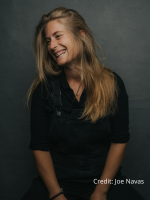For years now, farmer Stephanie Rein of the non-profit Sustainable Cape in Truro has been teaching kids about growing food. She does this in multiple elementary schools on the Outer Cape, and when she first started, she had the kids make something she called a seed wish list.
"So, two crops that they would like to grow. And depending on the grade, you know, a first grader would just say, I want a red pepper, all the way up to the fifth graders having to tell me not only the variety of the crop that they want to grow, but also the days to maturity, the space, the depth and all of those things" Stephanie explained.
"And we talk about why those are important. So we had been doing that for a while. And my daughter, who's now a senior, was in fifth grade and she said, mom, the wish list is so annoying. We write it in our journal and there it stays. No one ever gets their wishes. Why do we waste our time?"
Ah, the feedback we get from our own kids. But, Stephanie took it in stride, and created something a similar but new that’s been much more popular.
"I realized we could do an election. And actually, you know, again, the word wish means it may grow. It may not, because that's what happens in a garden that children learn that, too."
And it’s also what happens in an election — your candidate may win and they may not. And when the kids began to understand this — that if their seed selection won, they could actually grow their chosen crops in the spring — they got serious, starting with a primary in the classroom:
"The children get to stand up and discuss the crops that they’ve chosen and try and encourage other students to vote for their crop. And we just sort of let it unfold and I had fourth and fifth graders who were caucusing and the teacher’s looking at me and I’m looking at her — yep, I don’t know, they’re doing it!"
So now each year the kids caucus and they have their primary and then they start making campaign posters.
"With slogans like, 'It's the juiciest watermelon, you’ll love it!' And I will say, every year, somebody wants a tiny little watermelon. It’s the most voted for crop. And then once the, um, election posters are complete, they are hung somewhere that's highly visible and, well trafficked in the school."
And then the students deliberate. They take a few weeks to look at the posters, soak up the information, talk to their peers, and get ready for voting day.
"And it’s a blind ballot. And I go class to class and they have all the crops and each student gets to vote for two, and I remind them, you can’t vote for the same crop twice, because people would like to do that, and if they do, then one of their votes won’t count, and as we know, every vote counts…"
In recent years the winners of the school crop elections have all been sweet things—tiny watermelons, yes, but also high bush blueberries and strawberry plants and when my younger daughter Nora participated a few cycles back, sweet potatoes.
"Which I’m excited for, because who doesn't love to grow potatoes and the kids love to harvest buried treasure, and it’s sort of a way to get them involved in the political process with something that they really are passionate about and they were so excited and just really campaigned hard."
Elspeth: Yeah, Nora was thrilled. So I think some of her candidates did well!
It’s what we all hope for right—whether we’re voting for fruits, vegetables or presidential candidates—which reminds me don’t forget to vote on November 5th.
—
Learn more about the Farmer in the School program here: https://sustainablecape.org/programs/farmer-in-the-school-program/











